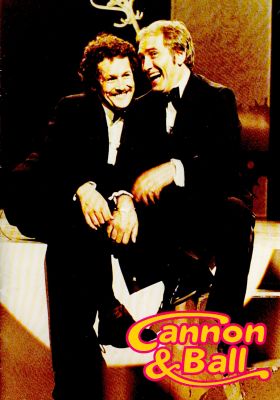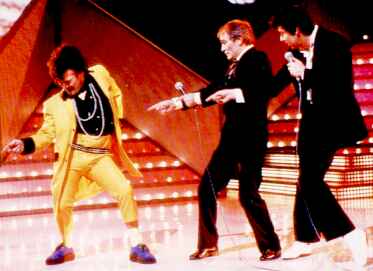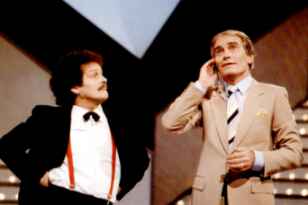
Tour Dates and Places
| Sun 19th – Mon 20th Feb | Croydon Fairfield Hall |
| Tues 21st Feb | Portsmouth Guild Hall |
| Thurs 23rd Feb | Southend Cliffs Pavilion |
| Fri 24th – Sun 26th Feb | Oxford Apollo |
| Mon 27th – Weds 29th Feb | Batley Frontier |
| Fri 2nd Mar | Kendal South Lakeland Leisure Centre |
| Sat 3rd Mar | Middlesbrough Town Hall |
| Mon 5th – Sat 10th Mar | Windsor Blazers |
| Weds 14th Mar | Sheffield City Hall |
| Thurs 15th Mar | Coventry Apollo |
| Fri 16th Mar | Wembley Conference Centre |
| Sat 17th Mar | Southampton Gaumont |
| Weds 21st Mar | Blackburn King Georges Hall |
| Thurs 22nd Mar | Derby Assembly Rooms |
| Fri 23rd Mar | Hanley Victoria Hall |
| Sat 24th Mar | Gloucester Leisure Centre |
| Mon 26th – Tues 27th Mar | Nottingham Concert Hall |
| Weds 28th – Sat 31st Mar | Purfleet Circus Tavern |
| Sat 21st Apr | Eastbourne Congress Theatre |
| Sun 22nd – Mon 23rd Apr | Bournemouth Winter Gardens |
| Fri 27th – Sat 28th Apr | Newcastle City Hall |
| Sun 29th – Mon 30th Apr | Glasgow Kings Theatre |
| Weds 2nd May | Edinburgh Playhouse |
| Thurs 3rd – Fri 4th May | Aberdeen Capitol |
| Sat 5th May | Dundee Caird Hall |
| Tues 8th – Fri 11th May | Norwich Theatre Royal |
| Sat 12th – Sun 13th May | Ipswich Gaumont |
| Fri 18th – Sat 19th May | St. Austell Coliseum |
| Mon 21st – Tues 22nd May | Bristol Hippodromw |
| Weds 23rd – Thurs 24th May | Cardiff New Theatre |
| Sat 26th May | Blackpool Opera House |

Souvenir Programme Article
The rise of Cannon and Ball to becoming the most consistently ‘in demand’ double act in the country is one of real success. Success that can be measured in the respect of admiration of their fellow artistes and the loyalty of their ever growing audience. The Cannon and Ball story is one of talent, hard work, and continual striving for perfection. This dedication is amply demonstrated nightly when they “top the bill” at the country’s leading theatres and cabaret clubs.
There cannot be many artistes today who are kept as busy as Cannon and Ball. But their success is no accident, it has been hard won. Indeed, Cannon and Ball have been regarded as one of clubland’s funniest entertainers to have won the prestigious Club Mirror ‘Comedy Act of The Year’ award on three seperate occasions.
It was in 1961 that Cannon and Ball first worked together for a North West engineering company. It was here that there stage relationship developed. “Tommy used to look after me when I got into trouble. We were always fooling about for the lads at work.” (Bobby Ball)
Encouraged by an enthusiastic response at work, they would often be found in the evenings entertaining a wider audience. This part of homely Lancashire is still the guardian of the music hall tradition. Talent shows and social clubs will play an active part in the community. It was to these that Cannon and Ball turned. Initially they performed as a singing duo. “I used to sing” recalls Bobby Ball, “and Tommy would accompany me on the drums, then we would swap over and Tommy would sing to my accompaniment – all for �3 a night.
However, their talent for comedy soon began to enter the act. Comedy entirely original and unique: comedy loosley based on their working relationship as welders. As the act developed through appearances in the pubs and social clubs of South East Lancashire, they began to look out for opportunites to enter showbusiness.
Working mainly in social clubs in the north of England, Cannon and Ball can look back at overcoming some of the toughest audiences in the country. Sometimes they were “paid off” after only one appearance. One night in Newcastle they went on stage to complete silence. They were sitting afterwards in a state of mild shock when the manager came into their dressing room to congratulate them! “You did well lads” he said, “You kept ’em quiet.”
Cannon and Ball not only survived this experience, but learned how to build a following that is now the envy of many top artistes. At this time they were known as The Harper Brothers. In 1970 they teamed up with their present manager, Stuart Littlewood, who persuaded them that a change of name would be for the better. Over lunch one day the three came up with the name Cannon and Ball and from that point they have never looked back.
After two years, Cannon and Ball started to attract attention outside the north of England. In 1965 they began to appear throughout the country. It was now that their earlier tough apprenticeship proved invaluable. They were quickly able to overcome many of the problems that some northern comedians experience when appearing outside the region.
Never having to rely on dialect or stories, their zany style needed only subtle change.
In 1972 Cannon and Ball undertook tours to Australia and South Africa for cabaret and radio.
However, their early television experiences had been less kind to the pair. Cannon and Ball still look back in anguish to the night opportunity knocked on Hughie Green’s talent programme. “We were terrible”, says Bobby Ball. “We were the proverbial ‘Opportunity flops'”. At the end of their act the clapometer, which registers the audience’s applause “scarcely flickered”, he says.
They were learning. There was another TV chance with ‘The Wheeltappers and Shunters Social Club’. Then came a projected series of appearances on Bruce Forsyth’s ‘Big Night’.
But before they had reached the screen the programme had run into ratings trouble and in the subsequent revamping their contributions had ended up on the cutting room floor.
In 1978 they undertook a nationwide tour with the American singer, Gene Pitney, appearing at the London Palladium and other major theatres.
Another TV mis-fire for Cannon and Ball came in July 1979, when technicians pulled the plugs on ITV after two shows of their first series, and it was October before the series returned. However, this series established Cannon and Ball as firm favourites with millions.
Their record-breaking panto at Bradford ran into March 1980, when they began to work on the Saturday night TV series, followed by a highly successful summer season at Great Yarmouth.
All in all, it was a hectic twelve months for Cannon and Ball. It was a year ago that their second TV series took off and they reached the number 10 spot i nthe ratings, and between May and September they filled the 1,500 seats of Blackpool’s North Pier twice-nightly and six times a week. There were occasions when enthusiastic audiences stormed the stage.
All 7,000 tickets for a week at a Birmingham theatre were sold out eight months in advance. Even such international stars as Jack Jones, The Three Degrees, and Dionne Warwick, had not attracted such interest, said the manager, who added: “With these bookings we could play them 52 weeks in the year.”
But for a couple of proud north countrymen the final accolade came in the autumn when they were invited to switch on the Blackpool illuminations: an honour which compares roughly with having a rose named after you at the Chelsea Flower Show. Their immediate predecessors in this role were Kermit and Red Rum. “They ran out of animals”, jokes Bobby Ball.
Their LP Rock On Tommy gained them a silver disc and their new single Hold Me In Your Arms, taken from their second LP Cannon and Ball Together, is selling very well.

1982 was a sensational year for the boys. Their TV series topped the ratings in May/June and their summer show at Bournemouth broke all previous records, taking over �1m at the box office. Christmas that year brought their first ever West End season at the Dominion Theatre, Tottenham Court Road. This ran for seven weeks and once again broke all records for a non-pantomime West End Christmas Show. The advance demand for tickets was so great that virtually every seat for the run had been sold before the show opened. Just three days after the Christmas Show finished, Cannon and Ball attended the Variety Club Luncheon at the London Hilton Hotel where they were proud to receive the ‘Show Business Personalities of the Year’ Award for their achievements in 1982.
These achievements have been further surpassed in 1983 with a record-breaking 13 week Spring theatre tour, in which the boys played a total of 134 performances in 90 days. In March Cannon and Ball’s first full length feature film ‘The Boys In Blue‘ was premiered in Manchester and went on general release shortly afterwards. The film has proved very popular with family audiences and has just been released on video cassette.
Summer season was spent at Scarborough, once again enjoying capacity business, and in the autumn Cannon and Ball paid their first ever visit to Ireland, covering theatres in both Ulster and the Republic. Following a brief cabaret tour in October, their touring live work concluded with two sell-out concerts at the London Palladium – their first ever headlining appearance at the world’s top theatre. Christmas 83 again saw Cannon and Ball starring in their own show at the Apollo Theatre in Manchester, and a firther highly successful series for London Weekend Television.
Following the Spring theatre tour, they will visit the Middle East, followed by a summer season in the beautiful Devon resort of Torbay and next Christmas will find them at the Hippodrome Theatre in Birmingham. At the same time, discussions are continuing about a possible script for their second feature film and a further LP record should be due in 1984 if the boys have an opportunity to fit it in.
A few years ago, Eric Morecambe named them as “the next double act”, and has since gone on to say: “I like them because they emanate a lot of warmth, Bobby Ball has a lot of heart and Tommy Cannon isn’t just a straight man. Another five years will establish them in a big way”. Eric Morecambes prediction certainly came true!
They are certainly repaying this early confidence and it is easy to see why Cannon and Ball are so much sought after as top stars in Britain’s theatres and television.
Support Acts
| Dave Wolfe | February and March | Comedian and Compere |
| Jade | February and March | Singer |
| Dudley Doolittle | April and May | Comedian and Compere |
| Sonny Hayes and Co. | April and May | Comedy Sketches |
| Rocky Sharpe and the Replays | Whole Tour | Rock and Roll band |